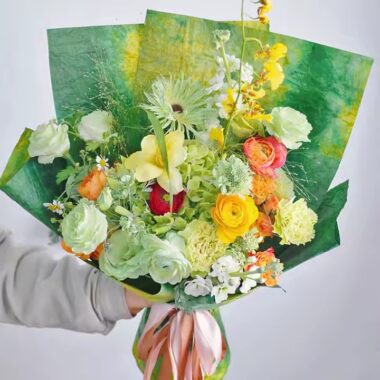Introduction
Sustainability has become a central topic for businesses in every sector, from retail to food service. Packaging is no exception, and wrapping paper is now a key part of eco-friendly strategies. Today’s consumers expect brands to reduce waste and use materials that reflect environmental responsibility. This shift has encouraged global buyers to seek eco-friendly wrapping paper options from trusted manufacturers and suppliers. By choosing the right materials and partners, businesses can meet customer demand while also contributing to a greener future.
📌 1. Why Sustainability Matters in Wrapping Paper
Traditional glossy or plastic-coated wrapping papers often end up in landfills because they cannot be recycled. This reality has changed the way companies and consumers view packaging. Eco-friendly wrapping paper is designed to minimize environmental impact, either by being recyclable, biodegradable, or sourced from sustainable forests.
Retailers and food brands that adopt sustainable packaging solutions demonstrate their commitment to both quality and responsibility. Beyond customer satisfaction, eco-friendly materials also help companies comply with tightening global regulations.
📌 2. Kraft Paper – Natural and Recyclable
Kraft paper remains one of the most popular eco-friendly options. Its natural brown appearance conveys authenticity and environmental responsibility. Wrapping paper manufacturers offer kraft in various GSM weights, making it versatile for gift wrapping, floral arrangements, and food packaging.
Recyclable and often FSC-certified, kraft is particularly attractive to European and North American buyers. A wrapping paper supplier can provide plain kraft for rustic branding or add custom printing to align with corporate logos and seasonal campaigns.
📌 3. Recycled Paper – Closing the Loop
Recycled paper is an effective way to minimize waste by reusing existing materials. High-quality recycled wrapping paper can still support colorful printing and specialty finishes, making it suitable for both retail and wholesale applications.
For brands aiming to showcase their sustainability credentials, recycled paper is an excellent option. Suppliers highlight this choice as part of circular economy practices, helping companies demonstrate environmental leadership without sacrificing style.
📌 4. FSC-Certified Paper – Responsible Sourcing
Forest Stewardship Council (FSC) certification ensures paper products come from responsibly managed forests. Many global buyers require this certification as proof of sustainability.
Working with an FSC-certified wrapping paper manufacturer gives businesses confidence that their packaging meets international standards. Whether for food chains or luxury retailers, FSC materials align with corporate sustainability goals and resonate with eco-conscious consumers.
📌 5. Biodegradable and Compostable Coatings
For food-grade wrapping paper, grease resistance is often required. Traditionally, this has been achieved with PE or wax coatings that are not always environmentally friendly. The latest innovation involves biodegradable or compostable coatings that provide the same protective qualities without leaving harmful residues.
These advanced coatings are especially relevant for burger wraps, cheese papers, and chocolate packaging. A custom wrapping paper supplier offering such solutions allows food brands to combine safety with sustainability.
📌 6. Soy-Based Inks and Non-Toxic Printing
Sustainability is not only about the paper itself but also about the printing process. Many wrapping paper factories now use soy-based inks, which are renewable, biodegradable, and produce vibrant colors. Non-toxic inks are especially important for food-related packaging, ensuring safety without compromising design quality.
By integrating eco-friendly inks, wrapping paper manufacturers support brands that want to showcase environmental responsibility across every aspect of their packaging.
📌 7. Balancing Eco-Friendly Choices with Business Needs
While sustainability is essential, businesses must also consider cost, lead times, and functionality. Kraft and recycled papers are generally cost-effective, while biodegradable coatings and specialty eco options may come with higher prices.
The role of a reliable wrapping paper supplier is to guide buyers in finding the right balance. By offering multiple eco-friendly materials, suppliers help businesses meet both environmental targets and budget requirements.
📌 8. The Growing Role of Chinese Wrapping Paper Factories
China has become a leading source of eco-friendly wrapping paper. Manufacturers there combine advanced machinery with eco-certified materials, offering global buyers a wide range of sustainable packaging solutions. From FSC-certified kraft to biodegradable coatings, Chinese factories are helping brands worldwide reduce their carbon footprint.
Buyers benefit from competitive pricing, reliable quality, and scalable production. Working with a wrapping paper factory that emphasizes sustainability ensures businesses can meet international standards and market expectations.
Conclusion
Eco-friendly wrapping paper is no longer a niche option — it is a necessity for modern packaging strategies. From recyclable kraft to biodegradable coatings and FSC-certified sources, sustainable wrapping paper allows brands to protect their products while protecting the planet.
By partnering with a trusted wrapping paper manufacturer or supplier, businesses gain access to reliable custom solutions that balance design, cost, and eco responsibility. As consumer awareness continues to grow, eco-friendly wrapping paper will remain a powerful tool for both branding and sustainability.
















